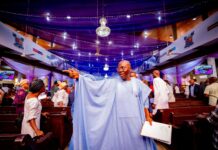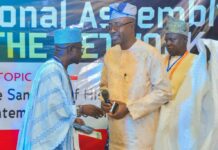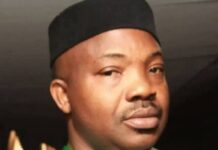
***The recession was just not something that occurred in a cyclical fashion – not just another economic occurrence. No! It was unbridled corruption on a scale that was unprecedented anywhere in the world.
ADDRESS BY THE VICE PRESIDENT OF THE FEDERAL REPUBLIC OF NIGERIA, HIS EXCELLENCY, PROF. YEMI OSINBAJO SAN AT THE LEGISLATIVE ECONOMIC SUMMIT THEMED LEGISLATIVE FRAMEWORK FOR ECONOMIC RECOVERY AND SUSTAINABLE DEVELOPMENT AT THE INTERNATIONAL CONFERENCE CENTRE, ABUJA ON NOVEMBER 6, 2017.
Protocols
Let me begin by saluting the House of Representatives for taking the initiative to establish a Committee, dedicated to working with other stakeholders to get Nigeria out of the 2016 – 2017 recession.
In similar vein, I must commend the Honorable Members of the Committee for their sterling work of investigating the issues, consulting with relevant stakeholders, and coming up with useful insights and recommendations for policy actions to end the recession.
I have titled my remarks here, The Nigerian Recession: We must never walk this way again.
The story of the Nigerian recession must be told often, and more importantly, truthfully. There are two reasons why; the first is so as to ensure that never again, do we experience the horrors and deprivations of a recession, the second is that we cannot afford another recession, not now or in the future.
Permit me to quickly retell that story as I understand it, of how we got into a recession. Three reasons: one, we were running an unstable economic structure. Oil alone contributed 70% of budgetary revenues and 90%, perhaps more than that, of our foreign exchange revenues.
Up to 50-53% of the non-oil sector was dependent on the oil sector. Consequently, the fortunes of up to 60% of the Nigerian economy, rested on this volatile sector. This shaky foundation was masked in the past by high oil prices, but as soon as oil prices fell, the weakness showed.
The second weakness in our economic structure is that it had mainly been consumption driven with a high propensity to import. Worse still, we were importing food, food that we could grow. Our unsustainable food importation bill at some point, was over N1trilion, it was particularly damning for the economy as foreign exchange revenues dried up.
In 2015, oil prices fell to as low as $28 at some point. But worse still, throughout 2016 we lost almost a million barrels a day in oil production due to vandalization and sabotage of oil facilities and pipelines. We lost something in the order of about 60% of our revenues. Yet we could have survived without going into a recession, I think Dr. Teriba so ably stated that, we could have survived if we had savings. But we had no savings only debt.
As economists would say, and as Dr. Teriba had said, we did not have the fiscal buffers to enable a counter-cyclical approach. In other words, we lacked the savings to see us through the lean times. Why? Why did we lack savings, when so much money was being made? This is the elephant in the room.
This leads us to the second reason for the recession – corruption! Unbridled corruption and waste. I think it is important for us to emphasize that, so that we do not think that the recession was just something that occurred in a cyclical fashion – just another economic occurrence. No! It was not another economic occurrence, it was unbridled corruption on a scale that was unprecedented anywhere in the world, is what we experienced in Nigeria. It is important that we emphasize it so we don’t walk this way again.
The figures speak for themselves. Between 2013 and 2015 with oil prices averaging up to $110 per barrel, sometimes going to as high as $150, the government of the day somehow contrived to increase national debt from N7.9 trillion to N12.1 trillion while reducing external reserves from $45 billion to $28 billion as of May 2015.
Of course, we all know that there was very little by the way of investment in infrastructure and capital projects. In fact in 2015, capital spend was less than 11%. So there was very little to show for where this money went.
I don’t want to keep repeating some of the incredible things that happened, a few weeks before the last elections; how large sums of money, a 100billion in cash ostensibly for security. Another $289million in cash was paid out in the same period. No country can survive that kind of unbridled waste and corruption. We must never forget, that corruption is perhaps, the most outrageous cause of our economic decline.
Aside from barefaced stealing or waste of resources, the inflation of contracts and other procurements ensures that the cost of infrastructure necessary for development will always be unaffordable. So if what we should spend on building a 200km road ends up being spent on a 20 km road, there is no way we are going to make any progress and there is no way we won’t end up in some kind of economic decline or the other.
Today, we can say that despite the 60% or even more reduction in revenues from oil, we are bailing out the States and our capital spend in 2016 was close to N1.3trillion, the highest yet in the country’s history. So with more prudent management, it is possible to do more with far less money.
Permit me to comment on two of the other major causes for the deepening of the recession. One is the intractable delays in the budget approval process and two the long procurement processes.
If the budget process takes up to 5 months of the financial year and procurement is another 3months we have already ensured that the economy will be at a standstill for most of the year.
The truth is that no developing economy can afford the luxury of prolonged executive/legislative wrangling over the budget. Developed economies with strong and independent private sectors may be able to cope, but Nigeria simply cannot.
Budgetary delay in a situation of national economic emergency, and the hardship encountered by so many, is simply wrong and unacceptable. Neither the executive nor the legislature can excuse itself. It is wrong for us to hold up the budget for that long. The delays of course, will ensure that money will not flow into the economy, and that capital projects will not be done.
Let us go back to the 1st reason why we must remind ourselves about the recession story. It is so that we do not go down this road again, how do we make sure we don’t?
It was clear to this government, that the solution to getting Nigeria out of recession, requires focused and determined leadership to take immediate and long-term measures to tackle our weak economic foundations. This found expression is in the Economic Recovery and Growth Plan of Government.
The recovery intended in the Plan was truly to take the economy out of recession, but in addition, it was to stem the slide in growth that occurred since 2014. We accordingly prioritized, actions to restore oil production at home through a New Vision for the Niger Delta, while working with our international partners to stabilize oil prices.
The results are clear, with oil production now at 2million barrels per day (including condensates which are not part of the OPEC quota) and our external reserves now stand at about $34billion.
A second plank of immediate actions taken was ensuring that consumption and investment did not contract any further. The Federal Government did paid its own salary obligations and extended support to the States to pay the backlog of salaries.
In addition our social intervention programmes put money in the hands of Nigerians through N-Power jobs for young graduates, about 200,000 have been engaged and another 300,000 are in the pipeline for engagement, microcredit loans for market women and artisans, and indirectly, by paying for meals for primary school children through our home grown school feeding programme.
The capital spend of about N1.3 trillion in the 2016 budget was unprecedented, but it was important in ensuring that money would go into the economy. This capital spend had the dual purpose, one – boosting growth through government spending but also to provide infrastructure to underpin what we hope would be a fast-growing, dynamic and diversified economy.
Moreover promoted the productive sectors of agriculture, manufacturing and solid minerals. It is well known that the agricultural sector continued to grow even during the recession due to the emphasis that we placed on sector through schemes like the Anchor Borrowers Programme and the Presidential Initiative on Fertilizer. I will return to this point briefly.
Industry returned to positive growth in the second quarter of this year after nine successive quarters of decline since 2014. This was of course due to the increased availability of foreign exchange for imports of intermediate goods and raw materials, more spirited efforts being made by local industries to source for raw materials, and also less onerous business conditions.
Indeed, our efforts to create a more business friendly environment yielded fruit only a few days ago when we exceeded our target of moving up on the World Bank’s ease of doing business rankings. We moved up 24 places instead of our target of 20 and we were named one of the 10 best reforming economies in the world.
It is important to emphasize that the Presidential Enabling Business Environment Council is a collaboration between the Executive, legislature and the private sector. I must commend the legislature for playing its part promptly and faithfully by passing two watershed pieces of legislation on the credit bureau and movable assets. These two legislatures were critical in the way that our economy was viewed by the World Bank and investors in the economy.
The Economic Recovery and Growth Plan remains our blue print for actions going forward, but let me just emphasize a few points. First, we will continue to provide strong macroeconomic management, by increasing revenues and getting out more delivery of infrastructure and services with every naira spent.
We will also maintain efforts to bring inflation down, stabilize the exchange rate and reduce interest rates. Similarly, our debt will be kept within sustainable limits while borrowing will be used strictly for capital expenditure and to rebalance the ratio of domestic to external debt.
Increasing productivity in agriculture and industry is critical. We simply must produce, productivity is crucial. This is easier said than done but it must be done. We have focused on agriculture and the agro-allied value chain with our focus on cheaper and improved inputs, local fertilizer production, cheaper credit for farmers through the Anchor Borrowers’ programme —productivity in the agricultural sector is at an all-time high. Rice imports have dropped by 70%. And we are fast becoming one of the largest producers of paddy rice in the world. Now we are producing about 7metric ton of paddy rice.
Agriculture is providing more jobs than ever before, as it contributes more to GDP. More investments are coming into agriculture; Walcot, one of the agro-allied companies, a few months ago, opened its 120,000 metric ton rice mill in Kebbi.
The Indorama opened a 3million metric ton fertilizer plant in Rivers State also a few weeks ago. Dangote is investing in a total capacity of 1million metric tons of rice mills and that will be ready by May 2018. Olam’s poultry and feed mill which recently opened in Kaduna is the largest in the country today.
In the same vein, we will continue to lay emphasis on adding value to our oil and gas resources. Thus, in addition to ensuring the availability of premium motor spirit and other refined petroleum products by supporting the building of additional refineries, including modular ones, we are also seeing viable investments in fertilizer, petrochemical and gas liquefaction plants.
Ensuring the availability and sufficiency of electricity remains a major priority for the Federal Government. It seems to have almost gone unnoticed, that our discussion about power generation has gone from talking about 4000 MW to 7000MW, alongside an increase in transmission capacity.
In addition, we remain focused on implementing the Power Sector Recovery Plan, the eligible customer arrangement and boosting the contribution of renewable energy to our national energy mix.
Transport infrastructure is one area in which Nigerians come into contact daily because roads, air and rail are essential for commerce, especially the movement of people and goods. While the Federal Government is making steady, but strategic progress on both the narrow and standard gauge rail lines, it is quite evident that it does not have the resources to repair and rebuild all of the road network that we all desire to see.
This is why the Federal Executive Council recently approved the revision and deepening of the Road Trust Fund. A scheme that would enable the private sector to develop roads of interest to them in exchange for tax credits. We already have several expressions of interest in this and there are already agreements that are going into operation in relation with this road trust fund.
We are confident that with this scheme, and other related ones such as handing over key roads to State Governments to repair would lead to a much improved road network in a short period.
Diversification of our revenue earnings from dependence on oil is a key policy objective for us. Aside from developing exports, effective tax collection is key. Federal and State authorities are being pushed to aggressively collect taxes. Without increasing taxes, if we spread the tax net, if we increase collection of taxes, we will be doing far better in terms of revenue than we are doing today.
The focus on oil, has also given rise to a complete dependence by the federal government but more so the States on the monthly federal allocation.
Most States today, earn less than N1billion a month from internally generated revenue. 15 States earn less than N500million a month and about three states earn less than N300million a month from internally generated revenue. Of course, these are outrageously low earnings from taxation.
Before oil, all that the three regions we had at the time, was agriculture and taxes. Yet the West, just to cite an example, was exporting cocoa, built the tallest building in Africa, the first television station in Africa, hundreds of miles of roads, farm settlements and industrial estates.
The same territory and more people are available today. So there is absolutely no reason we can’t ramp up taxes, but federal and state taxes.
Lagos, Rivers and Ogun States have shown what is possible with effective taxation and promotion of industry. Lagos generates more revenues now than 31 States put together. The revolution started in 2004 when President Obasanjo seized the local government funds of Lagos State.
With almost 40% loss of income from FAAC Lagos begun an aggressive reform of its tax system. The results is what we see today, that the State can survive without any recourse to Federal allocation.
Rivers States earns roughly N85billon annually, Ogun State earns N72billion. Ogun State is somewhat interesting because, unlike Rivers State which has a captive market of oil companies, Ogun State has had to aggressively attract industry and use its strategic proximity to Lagos to offer a cheaper deal to investors. So it has been able to ramp up its taxes.
I think that taxes are so crucial, collecting taxes, VAT, income taxes and corporation taxes will be crucial as we increase our revenues.
Finally, why is that we cannot afford another recession now or in the future? Simple, every year we are growing at the rate of 2.6% percent per annum. We can only create jobs and feed our people if our growth rate is at least double that figure. In other words, if we are able to increase our economy and possibly, double or triple that figure.
By 2050, we will have the fourth largest population in the world. Over 60% of that population will be young men and women who will need education, jobs and a future for their families.
There is no society yet on earth that has had that size of population and did not have the technology, educational facilities and other infrastructure to sustain it. The cost of being the first such nation will be too grave to bear.
Honorable members, distinguished colleagues, the obligation that history and providence has thrust upon us today is to honestly do all we can to ensure that the future of our people is secure and prosperous. We must not walk this path of recession again.
Thank you very much.






